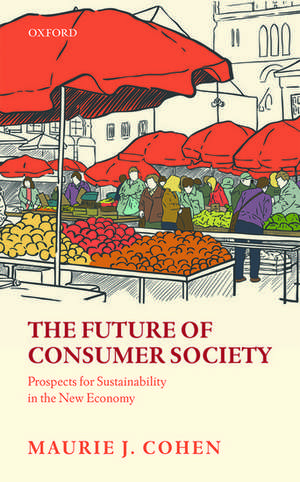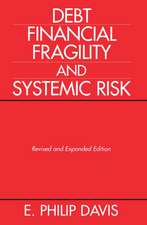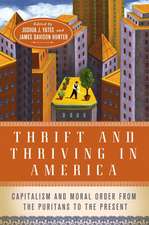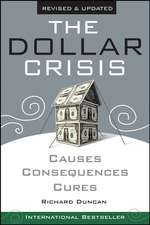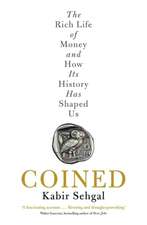The Future of Consumer Society: Prospects for Sustainability in the New Economy
Autor Maurie J. Cohenen Limba Engleză Hardback – 10 noi 2016
Preț: 399.01 lei
Preț vechi: 551.93 lei
-28% Nou
Puncte Express: 599
Preț estimativ în valută:
76.36€ • 79.43$ • 63.04£
76.36€ • 79.43$ • 63.04£
Carte disponibilă
Livrare economică 13-19 martie
Preluare comenzi: 021 569.72.76
Specificații
ISBN-13: 9780198768555
ISBN-10: 0198768559
Pagini: 234
Ilustrații: 10 Figures
Dimensiuni: 145 x 222 x 19 mm
Greutate: 0.39 kg
Editura: OUP OXFORD
Colecția OUP Oxford
Locul publicării:Oxford, United Kingdom
ISBN-10: 0198768559
Pagini: 234
Ilustrații: 10 Figures
Dimensiuni: 145 x 222 x 19 mm
Greutate: 0.39 kg
Editura: OUP OXFORD
Colecția OUP Oxford
Locul publicării:Oxford, United Kingdom
Recenzii
This timely and insightful book is a must-read for anyone interested in the future of Western consumer society. It offers a careful appraisal of the challenging circumstances in which the United Statesthe prototype of consumer societies worldwide finds itself today. Maurie Cohen, a leading expert on sustainable development, carefully outlines and weighs the promises and pitfalls of the alternatives currently being debated as potential pathways to more sustainable societies. Practitioners and policy makers concerned with the good life for consumers, workers, and citizens will find this book an inspirational reference tool.
Maurie Cohen has examined the contours of todays consumer society more searchingly than almost anyone. What he tells us in this insightful and very readable book is that key underpinnings of consumerism are weakening and may be crumbling. To those of us disheartened by the Sunday New York Times style magazine and appalled by the Black Friday shopping crushes, his findings come as good news indeed. His warning that we had better get busy shaping what comes next and his pointers in that regard are important contributions.
Cohen provides us with a measured and well-informed overview of the fragile and unsustainable state of 21st century consumerism. He draws upon a wealth of evidence to expose the limits of various attempts to move beyond consumer capitalismthe socalled sharing economy, the maker movement, and the move towards local production all of which, he suggests, are underpinned by many of the same problems that beset more traditional forms of consumerism. His book leaves us with profound questions about our future, as well as providing a compelling argument for both the necessity and the complexity of adopting more sustainable forms of human progress.
Maurie Cohen has examined the contours of todays consumer society more searchingly than almost anyone. What he tells us in this insightful and very readable book is that key underpinnings of consumerism are weakening and may be crumbling. To those of us disheartened by the Sunday New York Times style magazine and appalled by the Black Friday shopping crushes, his findings come as good news indeed. His warning that we had better get busy shaping what comes next and his pointers in that regard are important contributions.
Cohen provides us with a measured and well-informed overview of the fragile and unsustainable state of 21st century consumerism. He draws upon a wealth of evidence to expose the limits of various attempts to move beyond consumer capitalismthe socalled sharing economy, the maker movement, and the move towards local production all of which, he suggests, are underpinned by many of the same problems that beset more traditional forms of consumerism. His book leaves us with profound questions about our future, as well as providing a compelling argument for both the necessity and the complexity of adopting more sustainable forms of human progress.
Notă biografică
Maurie J. Cohen is Professor of Sustainability Studies and Director of the Program in Science, Technology, and Society at the New Jersey Institute of Technology and Associate Fellow at the Tellus Institute. He is Editor of Sustainability: Science, Practice, and Policy (SSPP) and co-founder and Executive Board Member of the Sustainable Consumption Research and Action Initiative (SCORAI). His books include Innovations in Sustainable Consumption: New Economics, Socio-technical Transitions and Social Practices (with Halina Szejnwald Brown and Philip Vergragt, Edward Elgar, 2013) and Exploring Sustainable Consumption: Environmental Policy and the Social Sciences (with Joseph Murphy, Pergamon, 2001). He holds a PhD in regional science from the University of Pennsylvania.
